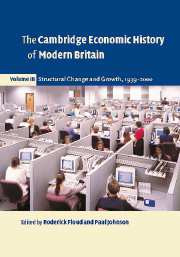Book contents
- Frontmatter
- Chapter 1 The war-time economy, 1939–1945
- Chapter 2 Failure followed by success or success followed by failure? A re-examination of British economic growth since 1949
- Chapter 3 The performance of manufacturing
- Chapter 4 A failed experiment: the state ownership of industry
- Chapter 5 Employment, education and human capital
- Chapter 6 Money and monetary policy since 1945
- Chapter 7 The financial services sector since 1945
- Chapter 8 Economic policy
- Chapter 9 The welfare state, income and living standards
- Chapter 10 The rise of the service economy
- Chapter 11 Impact of Europe
- Chapter 12 Technology in post-war Britain
- Chapter 13 Regional development and policy
- Chapter 14 British fiscal policy since 1939
- Chapter 15 Industrial relations and the economy
- References
- Index
Chapter 15 - Industrial relations and the economy
Published online by Cambridge University Press: 28 March 2008
- Frontmatter
- Chapter 1 The war-time economy, 1939–1945
- Chapter 2 Failure followed by success or success followed by failure? A re-examination of British economic growth since 1949
- Chapter 3 The performance of manufacturing
- Chapter 4 A failed experiment: the state ownership of industry
- Chapter 5 Employment, education and human capital
- Chapter 6 Money and monetary policy since 1945
- Chapter 7 The financial services sector since 1945
- Chapter 8 Economic policy
- Chapter 9 The welfare state, income and living standards
- Chapter 10 The rise of the service economy
- Chapter 11 Impact of Europe
- Chapter 12 Technology in post-war Britain
- Chapter 13 Regional development and policy
- Chapter 14 British fiscal policy since 1939
- Chapter 15 Industrial relations and the economy
- References
- Index
Summary
INTRODUCTION
Organised labour entered and left our historical period like a lamb, but for the central decades it dominated the political and economic scene like a lion. Managing trade unions was seen by government at times to be central to the task of managing the economy. Changes in the economy were to transform trade unions and, over the course of the period, the conduct of British industrial relations changed beyond recognition. This chapter is concerned with this change and with its economic implications.
The account begins with a brief discussion of the basic features of industrial relations and with an overview of how they changed. The chronological narrative is then broken into three twenty-year periods. The first takes us through the years of war-time regulation to the end of the relatively calm 1950s, a period during which Britain was widely perceived to have a settled (and even superior) system of industrial relations based upon collective bargaining. The second period was one in which this system began to break up, and in which governments, forced to abandon a laissez-faire approach, became embroiled in attempts at reform. The final twenty years witnessed irreversible changes, with collective bargaining undergoing substantial contraction.
THE BASIC FEATURES OF INDUSTRIAL RELATIONS
It is uncontroversial that the relationship between employer and employee is of profound economic significance. The way labour is managed determines its productivity, its cost, its welfare and its skills. What is controversial is how best labour might be managed, and who should be the beneficiaries. Employment is at heart a most unusual economic transaction, impossible to contain within a normal contractual arrangement because of the difficulties of monitoring and motivating workers, usually over continuous periods of many years.
- Type
- Chapter
- Information
- The Cambridge Economic History of Modern Britain , pp. 399 - 423Publisher: Cambridge University PressPrint publication year: 2004
- 1
- Cited by

